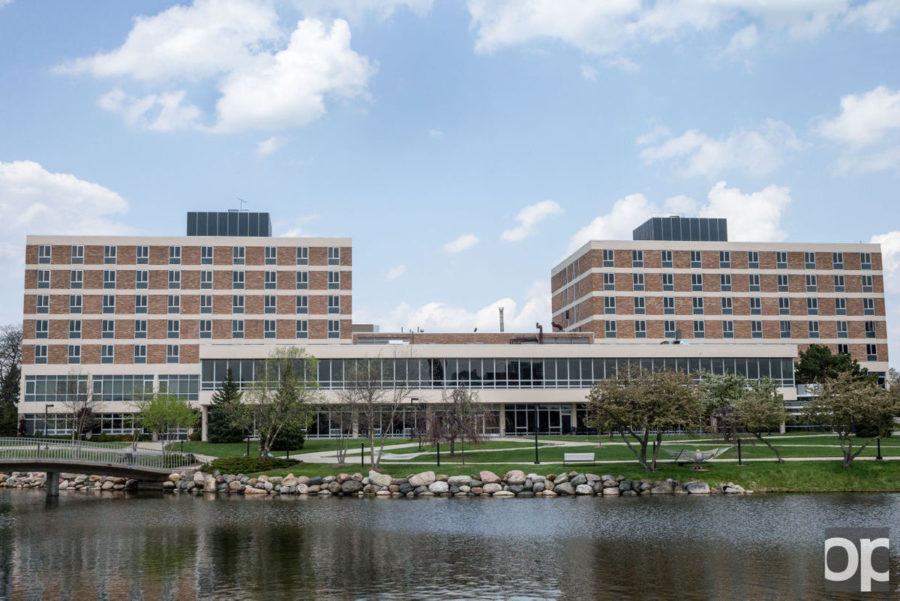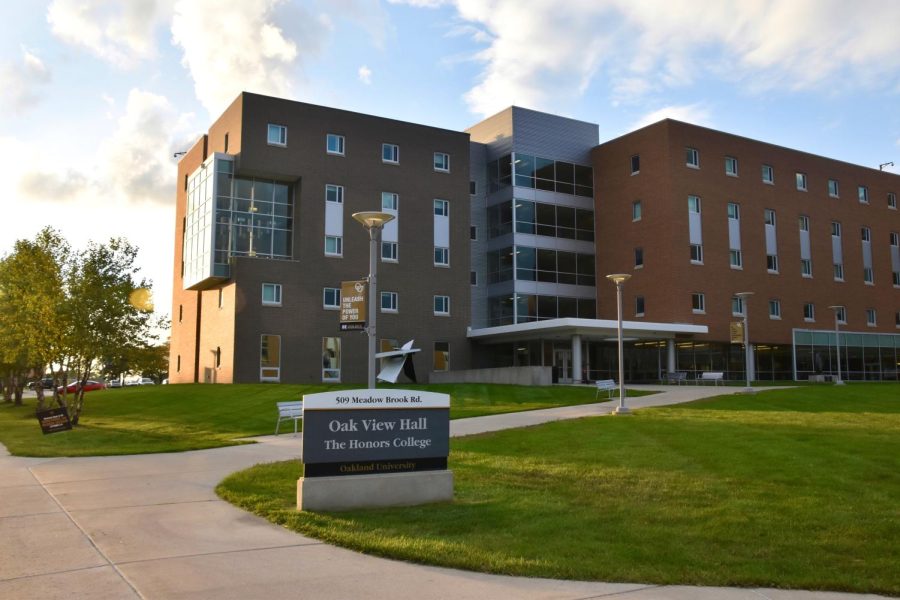After a hot day on Oakland University’s campus, some OU Housing residents return home to a cool and refreshing room where they can rest comfortably out of the heat. For other campus residential communities, students endure uncomfortable temperatures throughout the day and night.
The difference is the air conditioning (AC) — or lack thereof — for students residing in Hamlin Hall and Vandenberg Hall, and those attending Varner Hall and Hill House.
In Hillcrest Hall and Oak View Hall, students have access to a thermostat in their campus residence common areas that work well. Students from both communities highly regard both systems, referring to them as effective and easy to control.
Looking at these two buildings, the AC units seem to serve their purpose. However, the conditions of Vandenberg Hall and Hamlin Hall are a much different story.
In Vandenberg Hall, the rooms have an air vent and a heating and cooling dial somewhere along the walls. While the dials give the appearance of an AC system in the building, they are inoperable.
Charlotte Pierce, a student living on the fourth floor of Vandenberg Hall’s east side, recognizes the odd dial system and points out hers is defective.
“Last year, it didn’t seem like the air conditioning worked that great,” Pierce said. “We didn’t even know where the air conditioning knob was last year. It was hidden behind one of the beds. When we tried to use it this year, we tried to move the knob and it was stuck in heat. We can’t turn it to the cooling.”
While Vandenberg gives the facade of a fully functional heating and cooling system, Hamlin Hall, a building full of first-year students, has no such confusion. There is no AC in Hamlin Hall. Samaya Davis, a communications major residing in Hamlin Hall, explains the living conditions she and her friends go through each day.
“The AC has been terrible,” Davis said. “Especially for somebody who has asthma, it’s been really hard to breathe, especially with the humidity on top of that.
“My friend, she lives on the lower level [third floor], and she ended up having to come up to the fourth floor because this is the only place where it’s cool. She basically stayed up there for a couple of hours because she couldn’t stay in her room. She couldn’t breathe in her room.”
When asked why the third floor was so horrible, Davis referred to Hamlin Hall’s air quality.
“The air is incredibly thick and it’s really hot. It’s like you can feel yourself breathing in, and you struggle to really get any type of oxygen,” Davis said.
With living conditions such as these, one would expect OU to provide a disclaimer to the freshmen who have to stay there for the lack of AC, yet Davis says otherwise.
“They told us that there wasn’t any AC, but they said, ‘just bring a fan with you, it’ll be fine,’” Davis said. “It was way worse than they had explained it to us. The way that they told us was like, ‘Yeah it’s hot, but if you bring a fan you’ll be fine, and it’s kind of hot in the winter because they turn on the heater,’ but this is beyond what I was prepared for.
“I have to go out and buy a whole other fan. I have three fans going in my room currently and it’s still hot.”
In light of these concerning living conditions, Robert King, the senior director of housing at OU, sheds light on the university’s views on the situation.
After recounting the experiences of Vandenberg Hall residents, King explains the purpose of the dial-based air control.
“Vandenberg is one of those places that doesn’t have AC,” King said. “So if you were trying to fiddle with the system, it might not be working because the heating isn’t flowing into the system. That’s how that system is set up.”
The main reason why Hamlin and Vandenberg don’t have AC, according to King, is due to both buildings being built before AC was included.
“It’s just that air conditioning wasn’t included when the building was built, much like Hamlin, and other places across campus,” King said. “The cost to do updates of that sense for those buildings is pretty expensive, especially considering the window of time where air conditioning might be appropriately used.
“Once the temperatures drop a bit, which is pretty customary in this part of the country, the air conditioning is less efficient if you run it while your temperatures are in the 50s and 60s. In terms of air conditioning, there’s no major plans to update those buildings in terms of air conditioning.”
While King makes it clear these conditions aren’t changing any time soon, he speaks of another way students can avoid the heat while living in the older buildings.
“So, typically to avoid a stuffy room, you open a window,” King said. “The windows are functional, so the students can open the windows to get some air in some spaces. In fact, when the windows are open, it keeps the space pretty cool based on how the windows are designed.”
King spoke further about other ways students have managed their spaces despite the lack of AC.
“I can’t really speak to any specific challenges that students might be facing,” King said. “Partly because we continue to have the students in the summers, so camps and conferences have actually gone, and those visitors stay in those spaces during the summer.
“Temperatures are way higher than they are right now. Typically what folks do is they bring fans, and fans generally provide most of the cooling I think needed in the spaces. So generally, having a fan keeps folks pretty cool during the hottest parts of the summer.”
With AC out of the question, students want to take matters into their own hands. However, OU’s Housing prohibits personal AC units. King gives students two main reasons why they are prohibited.
“Early students here didn’t come to school with electronic appliances,” King said. “They didn’t come to school with computers, cell phones, multiple devices and all of that stuff, so the power loads in the rooms were different in how each electrical outlet was set up.
“The air conditioning in these spaces, the infrastructure will have a real strain on what’s already strained from different devices, so that’s one of the reasons. The second one is the window type since the windows weren’t necessarily designed for most cost-effective AC units.”
AC units do not seem to be coming to Vandenburg Hall and Hamlin Hall any time soon. With no plans to update the older buildings and portable units being prohibited, students may purchase fans or open their windows to manage the heat.
Students may contact the University Housing Office at [email protected] with questions or concerns.










